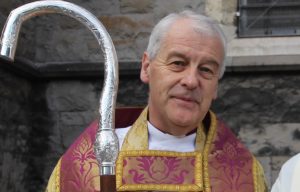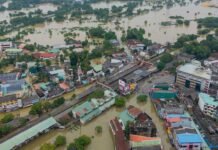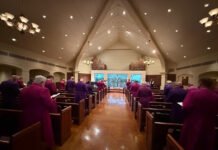“In the wake of last month’s advisory opinion by the International Court of Justice, we stand in solidarity with our brothers and sisters in the Episcopal Diocese of Jerusalem and with their fellow Palestinians.
“We know that those who live in Occupied Palestinian Territory do not need the opinion of the court to tell them of the daily hardships they endure. However, the publication of the court’s opinion highlights to the rest of the world that the occupation of Palestinian land by the State of Israel is unlawful and sets out a series of actions to be taken by nations and international organisations. It goes on to include its opinion that the State of Israel is under obligation to bring to an end its unlawful presence in the Occupied Palestinian Territory as rapidly as possible.
“During our joint retreat with clergy from the Diocese of Jerusalem and from the United Dioceses of Dublin and Glendalough in May of this year, we heard not only of the horrors of the war in Gaza, but also of the difficulties faced by our fellow clergy who live and minister in Palestine and Israel and who are Palestinians. We also heard of the experiences of their church members, including 23 year old Anglican Layan Nasir from Birzeit in the West Bank whose administrative detention ordered by a military court continues. Layan, who is a member of St Peter’s Parish, was taken from her home at gunpoint in April and has been detained without charge ever since. I spoke to her mother at the Diocese of Jerusalem’s Majma (Synod) in early May.
“The clergy told us that they were second class citizens in the State of Israel, a fact, they said, that was reaffirmed to them by the passing of the Nation State Law in 2018. They spoke of the difficulties they experienced in moving around in the Occupied Territory and between the Occupied Territory and Israel, of curfews and checkpoints and intimidatory actions by settlers. They said they were regularly denied permits to travel out of their own areas. Palestinians have been denied permits to travel to Israel to work or to access healthcare. Hospitals run by the diocese are impacted as many patients are not permitted to travel to them or are too afraid to do so.
“There have been raids on their churches and their summer camps for young people had to be held in separate locations this year as people could not travel freely between Israel and the Occupied Territory.
“In recent decades there has been a marked exodus of Christians, particularly young people, from the Holy Land due to a dearth of opportunities. This trend, our colleagues confirmed, has been accelerated leaving the numbers of Christians living in the Holy Land precariously low. Speaking in Dublin in May, the clergy said that those who remain feel it is a privilege to live there but they also feel intense pressure to ‘keep the faith alive’.
“We continue to call for an immediate ceasefire in Gaza and pray for peace in the whole region. We urge and pray that Ireland will continue to speak out in support of the ordinary people of the State of Palestine and that countries and international organisations around the world will take heed of the ICJ opinion and that Israel will act upon it.”
The United Dioceses of Dublin and Glendalough has had a friendship link with the Anglican Diocese of Jerusalem since 2016 and has also supported a range of initiatives including fundraising for Al Ahli Arab Hospital in Gaza City which is run by the Diocese of Jerusalem



